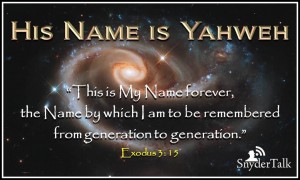[This was first posted 2012, reposted 2015.
In the addendum to our Statement of Faith on this website’s HOME page (see Further to our Statement of Faith) we wrote this:
“One of the books that greatly influenced our Sinai 6000 community is a book authored by James D. Tabor, Restoring Abrahamic Faith, available on the web at www.Genesis2000.org.”
Other articles from this MUST HAVE book are:
- Abrahamic Faith – 2 – The Awesome Name of God
- The WAY of YHVH – TORAH Faith for Non-Jews
- The WAY of YHVH – 5 – TORAH FAITH for Non-Jews?
- The WAY of YHVH – 5b -TORAH Faith for Non-Jews – Conclusion
- The Messiahs – 2 – The Davidic Messiah
- The Messiahs – 3 – The Second Coming of YHVH
- The Messiahs – 4 – Restoring the Biblical Balance
- The Messiahs – 5 – A Heavenly Messiah?
- Revisit: The WAY of SALVATION in TNK
Before we start our series on the saga of the Patriarch Abraham, here is the opening chapter of Dr Tabor’s book. When we think of Abraham, it is his journey of faith that comes to mind, but Dr. Tabor emphasizes what is of supreme importance when we read through the Hebrew Bible—-it is a portrait of YHWH, the God of Abraham and of Israel, the self-revealing God on Mt. Sinai. Reformatted for posting.—Admin1]
——————————
I am YHWH. That is My Name,
My Glory I will not give to another.
Isaiah 42:8
The foundational pillar of ABRAHAMIC FAITH is to know the Creator. Our problem today is that when we use the English word “God,” or even bring up the concept of the Divine we invite endless confusion and controversy. There are as many ideas and concepts of God as there are people who hold them.
Who or what is God?
Is God a Force, a Cosmic Mind, the Life Principle, the Process of evolution, or a metaphor for our inner selves?
Over the centuries humans have believed in and served multiple thousands of gods and goddesses. The Larouse World Mythology offers a lavishly illustrated 500-page survey of the myths and beliefs about these deities throughout human history. It is overwhelming just to thumb through this work and begin to get some grasp of the scope of human ideas about the Divine, and how “It” has been personified in such rich, varied, but contradictory ways.
The Hebrew Bible speaks of ONE GOD, beside Whom there is no other. In contrast to all other deities, or claims about divinity, this ONE GOD is called the true and living God (Jeremiah 10:10; Joshua 3:10).
The gods and goddesses of all the nations of the world are declared by the Hebrew prophets to be idols, empty vanity, and void of reality. They are largely personifications of Nature, and from a biblical point of view, they represent the various forces of the creation rather than the Creator. To put it in modern Freudian terms, they are illusions based on human imagination, fears, hopes, and dreams. They represent our all-too-human need to project onto the vastness of our violent and terrifying universe some way of coping with the workings of nature or the operation of Fate in our lives.
[Footnote: See Ernest Becker, The Denial of Death (New York: The Free Press, 1973) and Sigmund Freud, The Future of an Illusion (New York: Anchor 1964).]
The Biblical claim about ONE Creator God is markedly different in this regard. This is not a case of primitive ancient Hebrew chauvinism. It involves a profound revelation about the Creator, of whom and by whom are all things–the God who has acted in the complex and vast sweep of human history, yet can personally encounter us individually and directly.
The foundational confession of BIBLICAL FAITH is called in Hebrew the Shema. This “Great Confession” is repeated by observant Jews three times a day in prayer, but has been largely lost to Christian memory, even though Jesus the Nazarene declared it to be the absolute core of the true religion (Mark 12:29-31). It comes from the last sermon of Moses to ancient Israel:
Hear (Shema), O Israel!
YHVH is our God, YHVH is One!
You shall love YHVH your God with all your heart,
with all your soul and with all your strength.
And these words, which I command you today,
shall be in your heart
—Deuteronomy 6:4-6
[Footnote: This confession of the Oneness of God can be translated in a variety of ways
- YHVH our God, YHVH is One;
- YHVH is our God, YHVH alone; or
- YHVH our God is One YHVH.
The Name of God, written here without vowels as YHVH, I will discuss [later], but the concept of the ONE GOD, whom one is to love with one’s entire being, comes through here with absolute clarity.
This is ABRAHAMIC FAITH: all else is commentary.
The profound meaning and significance of this core and central affirmation—the greatest of all the “commandments” given by God—truly gets to the heart of BIBLICAL FAITH. The very reason God literally “created” the people of Israel, choosing them for a great historical mission, was so that they could witness to this central pillar of BIBLICAL FAITH, with all its implications (Isaiah 43:1). Notice the wording the following quotation from Isaiah in which God speaks in the first person, addressing the nation of Israel:
“You are my witnesses,” says YHVH,
“and My servant whom I have chosen
that you may know and believe Me,
and understand that I am He.
Before Me there was no God formed,
nor shall there be after Me.
I, even I, am YHVH;
and besides Me there is no Savior”
Isaiah 43:10-11
This is rather forthright declaration. It seems to encapsulate the bedrock foundation of the HEBREW FAITH. The people of Israel were to deeply absorb this vital notion of the singularity or “Oneness” of God, in order that they might declare it to the Gentile nations,
“that they may know from the rising of the sun to its setting,
that there is none besides Me,
I am YHVH and there is no other.”
Isaiah 45:6
Throughout the latter half of Isaiah the same point is made repeatedly. Note carefully, how Isaiah records God Himself declaring His uniqueness, without the slightest trace of ambiguity:
I am the First and I am the Last,
besides Me there is no God (44:6).
And you are My witnesses.
Is there a God besides Me?
Indeed, there is no other Rock;
I know not one (44:8).
I am YHVH who makes all things,
Who stretches out the heavens all alone,
who spreads abroad the earth by Myself (44:24).
I am YHVH, and there is no other;
there is no God besides Me (45:5).
Since the teaching about the ONE GOD is so basic to the three Abrahamic Faiths—Judaism, Christianity, and Islam—the implications of these unequivocal declarations can easily be assumed rather than absorbed. One has to seriously question, despite the flexibility of theological language, whether this declaration of the ONE GOD can be reconciled with the doctrine of the Trinity — God as three persons: Father, incarnate human Son, and Holy Spirit. Such declarations also make it crystal clear that there is no confusion or equation of the Messiah (Christ/anointed one) with the ONE GOD. . . .
It is an under-acknowledged historical fact that Jesus of Nazareth, a Jew, passionately affirmed this revelation of the ONENESS of God without the slightest compromise. Notice the following core declarations, each of which is found in our earliest and most reliable strata of gospel traditions:
Now a certain ruler asked him saying, “Good Rabbi, what shall I do to inherit eternal life?” Jesus said to him, “Why do you call me good? No one is good except One, that is God. But if you want to enter into life, keep the Commandments. (Luke 18:18-19; Mark 10:17-18; cf. Matt 19:17).
[Footnote: Notice how Matthew, according to some textual manuscripts, has been altered from the tradition in Mark and Luke to read, “Why do you ask me about what is good” (Matthew 19:17). Matthew reflects the beginning of an editorial rewriting of core Gospel traditions in order to give Jesus a more exalted status than he claimed for himself.]
[An expert in TORAH asks Jesus]
Which commandment is the most important of all?” Jesus answered, “The most important is, ‘Hear O Israel: YHVH our God, YHVH is One. And you shall love YHVH our God with all your heart and with all your soul and with all your mind and with all your strength.’ The second is this, ‘You shall love your fellow as yourself.’ There is no other commandment greater than these”
(Mark 12:28-30)
[Another expert in TORAH asks Jesus]
“Rabbi, what shall I do to inherit eternal life?” Jesus said to him, “What is written in the TORAH? What is your reading of it?” So he answered and said, “Hear O Israel, YHVH our God, YHVH is One! You shall love YHVH your God with all your heart, with all your soul, with all your strength, and with all your mind; and your fellow as yourself.” And Jesus said to him, “You have answered rightly; do this and you will live”
(Luke 10:25-28).
Christians who revere Jesus and his teachings cannot miss the clear and definitive content of these declarations. And yet, within fifty years of Jesus’ death we see a process at work by which Jesus was stripped of his most basic identity as a Jew who affirmed the Shema and upheld the Commandments of the TORAH and the WAY to eternal life. Jesus himself was declared to be God, even though he had declared so clearly,
“You shall worship YHVH your God and him only shall you serve” (Luke 4:8).
One has to conclude, just on the basis of these key statements of Jesus, that to know God as One, to love God with one’s whole being, and to follow the Commandments of God, are the fundamental core elements of the BIBLICAL FAITH that he practiced and upheld.
And yet, this teaching about the ONE GOD is not merely a technical doctrine one affirms. The verbs used by Isaiah, and echoed by Jesus, involve a deeply personal engagement. Isaiah echoed by Jesus, involve a deeply personal engagement. Isaiah writes of knowing, believing, and understanding just who God is, and from that comes the personal response of love and obedience (Isaiah 43:10; Deuteronomy 6:4-5).
BIBLICAL FAITH is a vital matter of personal involvement and commitment. To come before the ONE GOD, the Creator, YHVH, the God of Israel, is a very concrete and distinct experience. It involves the whole being—mind, soul, heart, and the very strength of one’s being.
Continued in: The Awesome Self-Description of God



Reader Comments